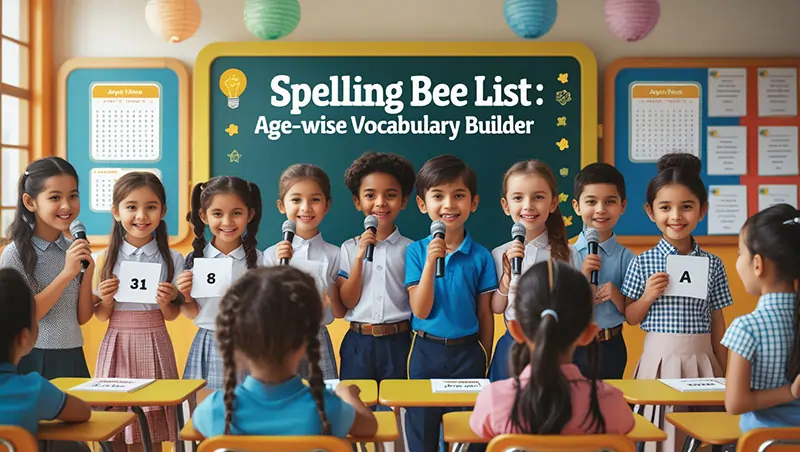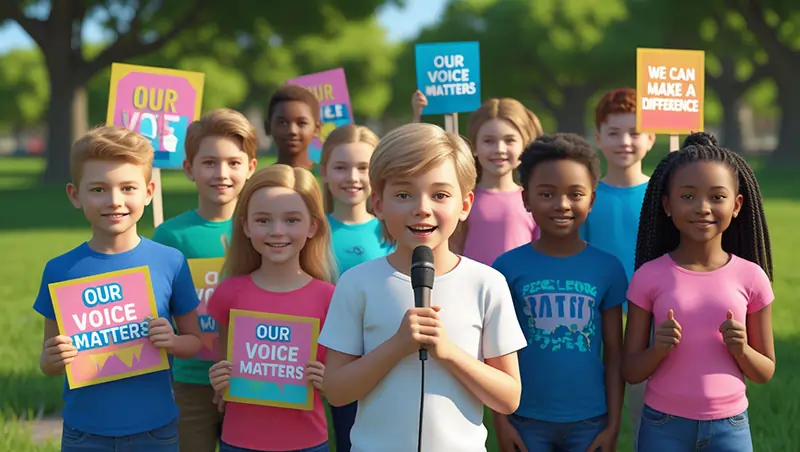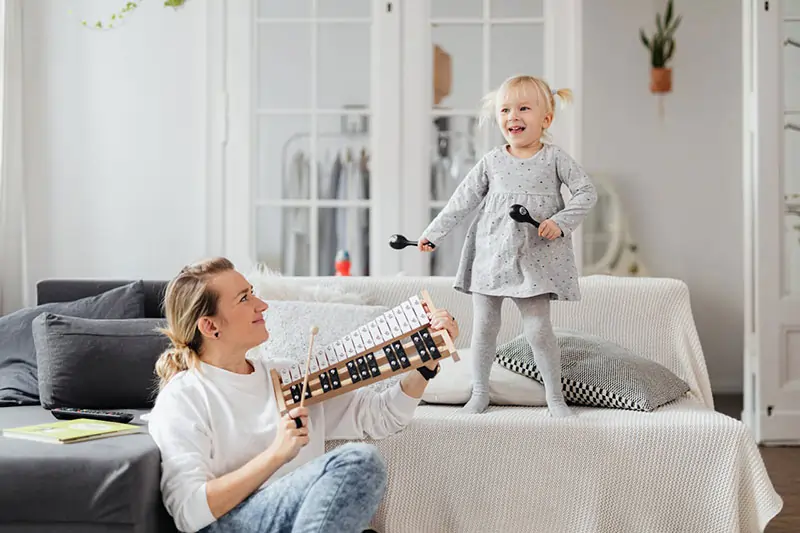Spelling Bee Word List: Age-Wise Vocabulary Builder
More than just a competition, a spelling bee is a great chance for kids to raise confidence, increase vocabulary, and hone spelling abilities. Effective language development depends on the age-wise spelling bee word list being created for various learning levels. Using grade-based word lists, learning strategies, printable tools, and interesting quiz games, this article offers a thorough guide on how to build vocabulary for kids.
Word Lists by Grade
Arranging word lists by school grade is one of the best strategies for children to acquire a strong vocabulary. This guarantees that kids are picking words fit for their reading and cognitive ability. Here is a detailed breakdown:
| Grade | Word Sample Sentences | Word Complexity Level |
| Grade 1 | cat, dog, sun, red, run | Easy |
| Grade 2 | school, pencil, lunch, water, happy | Easy to Moderate |
| Grade 3 | planet, library, picture, garden, animal | Moderate |
| Grade 4 | journey, volcano, ancient, whisper, treasure | Moderate to Complex |
| Grade 5 | microscope, democracy, satellite, expedition, equation | Complex |
| Grade 6 | architecture, revolution, biodiversity, protagonist, omniscient | Advanced |
Every list should build upon the previous grade, incorporating both fresh vocabulary and previously acquired words. This advancement increases long-term memory and confidence in usage.
Learning Methods
Development of vocabulary should be interesting and interactive. The following are several tested strategies for efficiently teaching children spelling bee words:
1. Phonics and Syllable Breakdown
Instruct youngsters on syllable or phonics based word breakdown. for instance:
- “volcano” becomes vol-ca-no
- “biodiversity” becomes bio-di-ver-si-ty
2. Use in Sentences
Young children should be encouraged to put fresh words in sentences. This supports contextual learning.
- Word: “ancient”
- Sentence: “The ancient castle stood tall on the hill.”
3. Word Mapping
Visual learners benefit from word maps that include the definition, a picture, synonyms, and a sentence.
![Word Map Example for 'Treasure'
[Central Bubble: Treasure]
- Definition: A valuable item or collection
- Synonyms: Riches, fortune
- Picture: Chest of gold coins
- Sentence: "The pirates searched the island for hidden treasure."](https://www.kidsworldfun.com/blog/wp-content/uploads/2025/05/word-map-example-for-treasure.webp)
4. Flashcards and Mnemonics
Make flashcards with pictures and make advantage of memory aids. For instance, “Microscope” – picture of a microscope and mnemonic “Micro = small, scope = see.”
Printable Versions
Parents and educators can use printable resources to support learning. These tools can be used in class or at home and should include:
Printable Word Lists (PDF Format)
Spelling Practice Sheets
| Word | Trace | Write | Use in a Sentence |
school | ________ | ________ | __________________________ |
planet | ________ | ________ | __________________________ |
Coloring Sheets for Younger Grades
Pair simple words with related images to color.
Example: Word – “Sun” → Picture of a sun with the word traced below it.
Progress Tracker Charts
Track progress with a visual sticker chart or bar graph.
![Diagram: Progress Tracker for Grade 3 Words
[Bar Graph with Words on X-axis and Stars Earned on Y-axis]](https://www.kidsworldfun.com/blog/wp-content/uploads/2025/05/progress-tracker-for-grade-3-words.webp)
Each word gains a star once correctly spelled in practice.
Quiz Games
Gamifying vocabulary for kids enhances retention and keeps their interest. These are some entertaining ideas for spelling bees:
1. Spelling Bee Showdown; arrange a peer-based mini-competition.
- Give every child a word and a time limit to spell it aloud.
2. Online Spelling Bees
- Make use of Quizlet or Spelling City apps.
- Create grade-specific word lists.
3. Word Bingo
- Create bingo cards from vocabulary words
- Get children mark the right word as you call out definitions or use words in phrases.
![Diagram: Bingo Card Sample (Grade 2)
[5x5 Grid with words: happy, lunch, water, pencil, etc.]](https://www.kidsworldfun.com/blog/wp-content/uploads/2025/05/bingo-card-sample-grade-2.webp)
4. Hangman Game
- Choose a word from the spelling bee word list.
- Let the child guess letters to complete the word.
5. Word Puzzle Challenge
- Create crosswords or word searches with spelling words.
- This reinforces recognition and spelling.
Benefits of an Age-Wise Vocabulary Builder
1. Developmentally Relevant Education
- At various ages matches children’s mental and language capacity.
2. Boosts Confidence
- Mastery of grade-level vocabulary increases self-esteem.
3. Foundation for Language Proficiency
- Early exposure improves reading comprehension and writing abilities, so laying a foundation for language proficiency.
4. Promotes lifelong learning
- Regular word learning ignites passion of language and inquiry.
Conclusion
Any child’s educational process would benefit much from an age-wise spelling bee word list. Vocabulary for kids becomes a dynamic and fun experience when combined with interactive learning strategies, printable resources, and interesting quiz games. Whether used in a house or a classroom, a structured vocabulary builder gets kids ready for success in spelling bees and beyond.
Call to Action:
Download your free printable word lists and practice sheets today and start building your child’s vocabulary for a brighter academic future!
Resources for Further Reading and Tools
- SpellingCity.com
- Quizlet.com
- KidsWorldFun Vocabulary Resources



